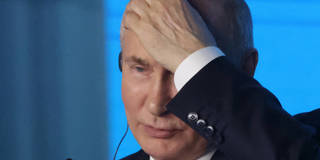OnPoint Subscriber Exclusive
The Big Picture brings together a range of PS commentaries to give readers a comprehensive understanding of topics in the news – and the deeper issues driving the news. The Big Question features concise contributor analysis and predictions on timely topics.

How Resilient Is Putin?
More than two years after Russia’s full-scale invasion of Ukraine, and mere weeks after opposition leader Alexei Navalny died in prison, Russia is preparing to hold its eighth presidential election – the fifth from which Vladimir Putin will emerge victorious. But, as certain as Putin’s upcoming victory is, questions about the robustness of his regime – and the sustainability of his war of aggression against Ukraine – remain.
As Anastassia Fedyk and Yuriy Gorodnichenko of the University of California, Berkeley, point out, Ukraine continues to “demonstrate its resilience in the face of a massive military and economic toll.” Meanwhile, “recent financial and economic developments” suggest that, contrary to what Putin would have the world believe, he has not “shielded the Russian economy from blowback.” Still, if Ukraine is to continue to defend itself effectively, the West must keep supporting it, not least by providing continued financial and military aid.
This is easier said than done. In both the United States and the European Union, political resistance to continued support for Ukraine is so strong that many – including the American Enterprise Institute’s Michael R. Strain – are calling on Western governments to seize frozen Russian central-bank assets and transfer them to Ukraine. This action is not only justified, given that “Russia launched an unprovoked, brutal invasion of a neighboring country”; it would also “breathe new life into the increasingly frail postwar order.”
The New School’s Nina L. Khrushcheva disagrees, warning that seizing Russia’s assets “would not be fully legal and would contradict the norms to which [the West] claims to adhere,” causing the West’s international reputation to “suffer considerably.” With “Russia’s success in weathering harsh sanctions” having “already amounted to something of a humiliation for the US and its partners,” the West can “ill afford” this outcome.
Russia’s resilience has much to do with gaps in the West’s sanctions regime. For example, as Robin Brooks, a former chief FX strategist at Goldman Sachs, and MIT’s Simon Johnson explain, Western goods are being transshipped to Russia from countries like Armenia, Georgia, and Kyrgyzstan. Western governments have so far done little to stop this trade “for fear of upsetting domestic industrial interests,” but it is not too late to use export controls to “deprive Russia of critical technology and make life harder for its people.”
This could chip away at Putin’s “façade of total control,” author Ian Buruma argues, much like the “open defiance” of dissenters like Navalny. Countries might be “warped by oppressive rulers,” but tyranny does not necessarily last forever. And when “regimes are defeated” or “tyrants die,” the example set by political martyrs like Navalny becomes crucial to help provide the “moral basis for building something better.”